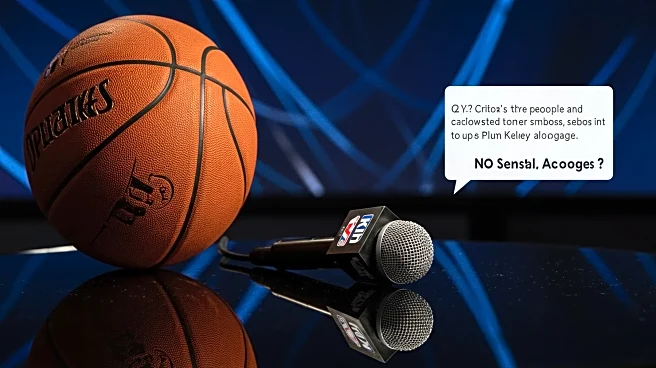What's Happening?
Kelsey Plum, a prominent player for the Sparks, recently addressed comments she made about Caitlin Clark's team during the All-Star Game. Plum admitted that her remarks, intended as a joke, were poorly received and led to backlash. During the All-Star Game in Indianapolis on July 19, Plum commented that Clark's team did not attend a morning meeting about collective bargaining agreement talks. This meeting was significant as players wore T-shirts with the message 'Pay Us What You Owe Us,' highlighting ongoing negotiations between the union and the WNBA. Plum's comments were meant to lighten the mood but were criticized on social media for detracting from the serious nature of the discussions. Plum clarified her intentions on Sue Bird's 'Bird's Eye View' podcast, expressing regret that her joke overshadowed the unity and purpose of the players' actions.
Why It's Important?
The incident underscores the sensitivity surrounding labor negotiations in professional sports, particularly in the WNBA, where players are advocating for better pay and conditions. Plum's comments inadvertently highlighted the tensions and challenges faced by athletes in negotiating collective agreements. The backlash serves as a reminder of the importance of communication and solidarity among players when addressing serious issues. The situation also reflects the broader societal discussions about fair compensation and recognition for female athletes, which have been gaining momentum in recent years. The WNBA's efforts to negotiate better terms are crucial for the league's growth and the empowerment of its players.
What's Next?
As the WNBA and the players' union continue their negotiations, the focus will likely remain on achieving equitable agreements that address the players' concerns. The incident may prompt players and league officials to be more cautious in their public communications, ensuring that the core issues remain at the forefront. Additionally, the league might take steps to facilitate more effective dialogue and collaboration among players to prevent similar misunderstandings. The ongoing negotiations will be closely watched by stakeholders, including fans and sponsors, who have a vested interest in the league's stability and success.
Beyond the Headlines
The situation highlights the cultural dynamics within sports, where humor and camaraderie can sometimes clash with serious advocacy efforts. It also raises questions about the role of social media in shaping public perception and the potential for misinterpretation. As athletes increasingly use their platforms to advocate for change, the balance between personal expression and collective goals becomes more complex. This incident may encourage players to develop strategies for effective advocacy that resonate with both their peers and the public.










